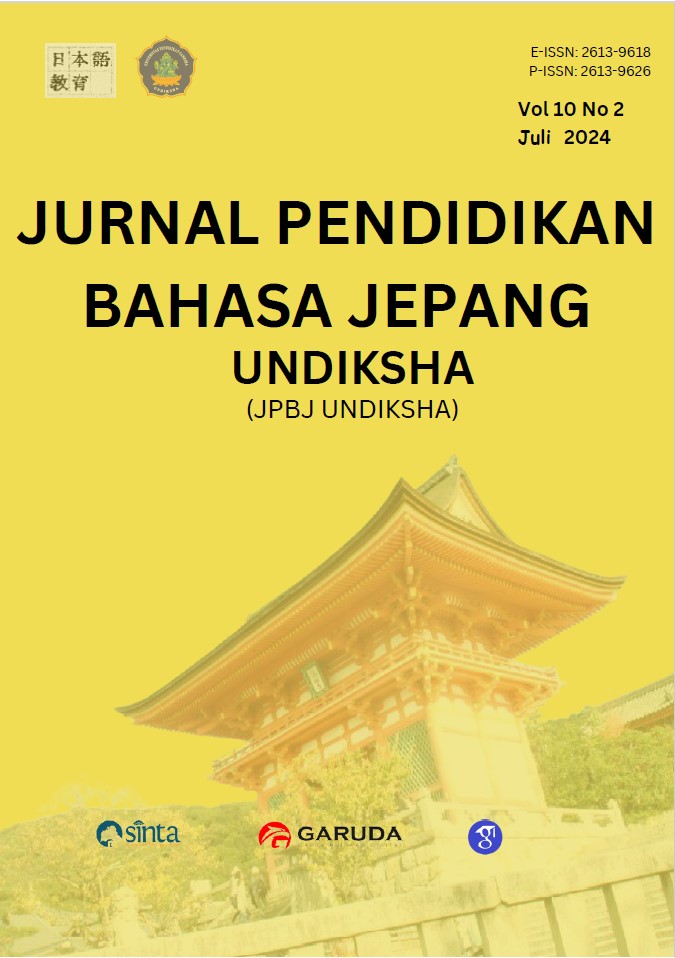Analisis Unsur Intrinsik Tokoh Dan Penokohan Roronoa Zoro Pada Komik One Piece
DOI:
https://doi.org/10.23887/jpbj.v10i2.72013Kata Kunci:
article, comics, intrinsic elements, characterizationAbstrak
This article focuses on the One Piece comic by Oda Eiichiro. This fictional comic was created in 1997 and made into anime in 1999, telling the adventures of a man who wants to become a pirate king named Monkey D Luffy. To achieve his goal, he recruited ten members. This research discusses the intrinsic elements of the character and characterization of Roronoa Zoro. The research uses qualitative methods which produce descriptive data in the form of written words. Analysis result shows that the character Roronoa Zoro is a deputy ship captain who is very loyal to his captain and is willing to sacrifice his life for his captain. However, the character Roronoa Zoro has a dark past because he doesn't know who and where his parents are. The character Roronoa Zoro experiences a change in character from being silent and gloomy and easily carried away by emotions to being responsible, loyal and nurturing to his fellow members. So the character Roronoa Zoro is classified as a developing character.
Referensi
Aminudin, “Pengantar Apresiasi Karya Sastra”, Jakarta, Indonesia: Sinar Baru, 2002.
B. Nurgiyantoro, “Teori Pengkajian Fiksi”, Yogyakarta, Indonesia: Gajah Mada University Press, 2010.
K. Kusmarwanti, “Tokoh Orang tua dan Refleksi Politik Orde Baru Dalam Novel-Novel Karya Kuntowijoyo”, Jurnal Litera, vol. 14, no. 1, hal. 152, 2015.
K. Yusuf, C. Nasir, M. Mahmud, “An Investigation of Intrinsic Elements and Moral Value in The Paddington Film”, English Education Journal, Vol. 13, No. 4, 2022.
M. Efendi, “Tokoh Gaara dalam Komik Naruto karya Khishimoto Masashi”, Padang, Indonesia: Fakultas Ilmu Budaya Universitas Andalas, 2014.
M. Scott, “Understanding Comics: The Invisible Art”. New York: Harper Perennial, 1993.
M. P. Singh, “Odyssey of the cultural narrative: Japan’s cultural representation in Eiichiro Oda's One Piece”, Global Media Journal-Indian Edition, Vol. 13, Issue1, Juni 2021
R. Duncan, “Toward a Theory of Comic Book Communication”, Henderson State University, 1999.
Sugiyono, “Metode Penelitian Kuantitatif, Kualitatif dan Kombinasi, edisi 8. Bandung, Indonesia: Alfabeta, 2016.
Sutrimah, M. Sholehuddin, N. Ulfaida, M.A. Haris, “Analisis Frasa pada Manga One Piece Vol 1-20 karya Eiichiro Oda: Kajian Sintaksis Sastra”, Prosiding Senada PBSI, Vol. 3, No. 1, 2023
Unduhan
Diterbitkan
Terbitan
Bagian
Lisensi
Hak Cipta (c) 2024 Jurnal Pendidikan Bahasa Jepang Undiksha

Artikel ini berlisensiCreative Commons Attribution-ShareAlike 4.0 International License.



